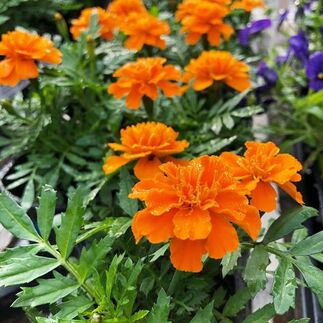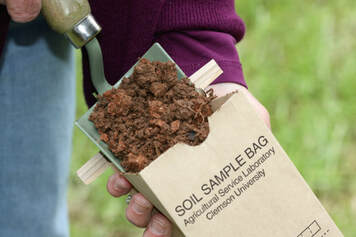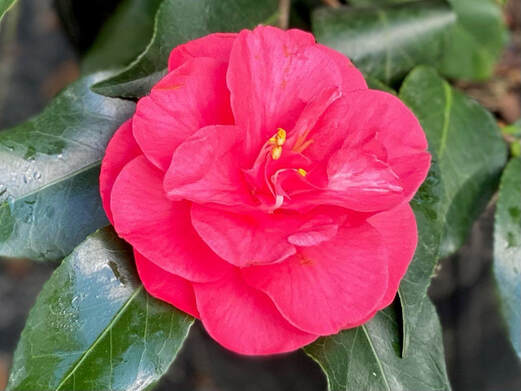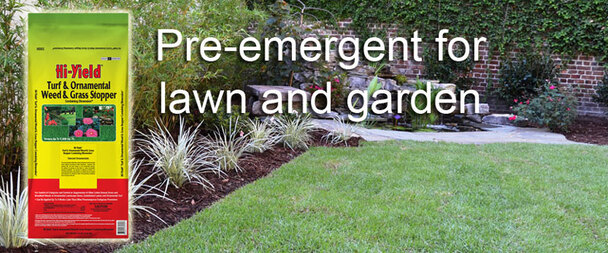Fall is Ideal for Planting in Our Area  Trees, Shrubs, Perennials & Annuals: Although potted plants can be planted anytime of the year, Fall is still the best time to plant hardy trees, shrubs, and perennials. Cooler temperatures and lessening light intensity mean less stress for the plants. Root growth will continue while soil temperatures remain around 50 degrees Fahrenheit and above. Always be sure to take into consideration the mature size of trees and shrubs as you decide what to plant. This precaution will eliminate the need to prune excessively or remove whole plants in the years to come. It is also time to be thinking about changing out your warm season annuals for cool season ones. Think about different color schemes using reliable bloomers such as violas, pansies, Cool Wave pansy, Panola Pansy, Snapdragons, Sweet Alyssum, Mums, and Dianthus. For foliage accents try Ornamental Brassicas such as Kale, Cabbage and Mustard, as well as Dusty Miller, and Herbs that prefer cooler temperatures such as Parsley, Dill, Fennel and Cilantro. Perennials such as Creeping Jenny and Lamium, are great to mix in with the annuals, especially in containers. For containers, mums are wonderful but usually have a short bloom period. Many can be treated as perennials though and planted in the garden when finished blooming. Ask about the varieties that can be treated this way. There are several evergreen plants that can be used as the main focal point of your containers. For shade areas try using Gardenias, Cast Iron Plants, Ferns, Farfugium, Pieris, Plum Yew, Azaleas, or Camellias. For sunnier placement, try Liriope, Lomandra, Boxwood, Holly, Encore Azaleas, Japanese Yew, Rosemary, Junipers or Palms.  Camellia season has begun! Our earliest blooming Sasanqua, Sparkling Burgundy, has started flowering. These evergreen shrubs are a must have for the southern shady garden. They are the Queens of the Fall and Winter Garden. There are different flower forms (Single, Semi-Double, Anemone, Peony, and Formal Double), as well as various colors, both variegated and solid. Camellias are long lived plants that are easy to cultivate and love. To learn more, visit the American Camellia Society website (American Camellias and consider joining the local Coastal Carolina Camellia Society. Guests are always welcome at the monthly meeting that occurs on the third Tuesday of the month at 6:30 October Calendar of Gardening Tasks PM. We typically meet at the Essex Village Church of Christ, 736 Savage Road, Charleston, SC. You can contact the Coastal Carolina Camellia Society President, Darren Sheriff, at his email: [email protected]. Soil Testing: Now is the time to prepare your vegetable garden for next spring. If you have not sent off a soil sample, there is still time. Your soil should be tested every three years at least. Commercial vegetable growers test at least once every year because lime application to correct pH is critical for plant growth. Every part of your yard can benefit from a soil test including the lawn and ornamental plantings. For more information on soil testing please visit: Clemson Soil Testing Clemson Fact Sheet Lawns: There is still time for a pre-emergent herbicide application for your lawn. Time your application after there have been at least four consecutive nights where temperatures were between 55- and 60-degrees Fahrenheit. For more information on weed management in lawns please visit: Clemson Managing Weeds Sometimes a winterizing fertilizer may be recommended by lawn professionals. If your soil is sandy and you did not fertilize regularly during the warm season your lawn may benefit from a potassium application at this time. The best way to know if your soil is deficient in any needed element, though, is to have it tested. So please read the section above on soil testing. |
Categories
All
Archives
June 2024
|



 RSS Feed
RSS Feed



